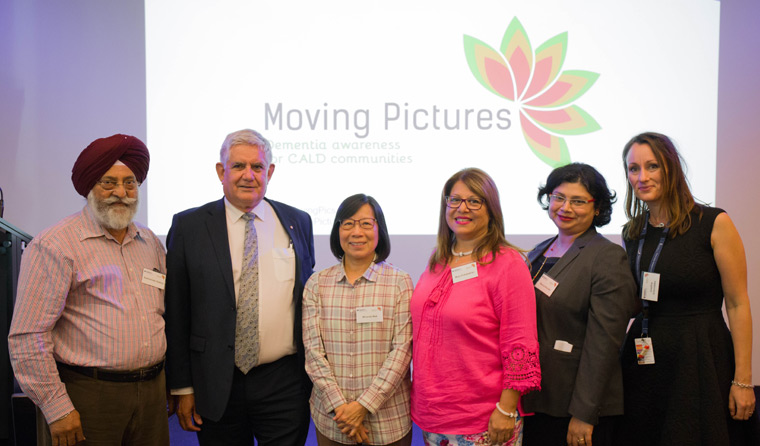Feature
Raising dementia awareness in multicultural Australia
The ‘Moving Pictures’ project has come up with an innovative way to raise awareness of dementia in Australia's diverse communities.
 Moving Pictures has produced movies and comic books to raise dementia awareness in CALD communities, available for free on its website.
Moving Pictures has produced movies and comic books to raise dementia awareness in CALD communities, available for free on its website.
Australia’s population is becoming increasingly diverse – and is also growing older.
‘About one in three Australians are from a migrant background, they’re culturally and linguistically diverse [CALD],’ Associate Professor Bianca Brijnath, Director Social Gerontology at the National Ageing Research Institute, told newsGP.
‘So Australia is an increasingly multicultural country, but we’re also increasingly ageing; there’s two things happening.’
As the Australian population ages, rates of dementia are also on the rise, which has led to concerns about ensuring there is enough capacity within the healthcare system to meet future patient need.
But at the individual level, one of the most vital concerns is the need to recognise the disease as early as possible.
‘Timely diagnosis is very important to people with dementia, their families and communities, to enable them to do a bit of planning, think about what kind of care they want, and what kind of interventions can be put in place, including end-of-life care,’ Associate Professor Brijnath said.
Recognising the signs of dementia can be challenging for any patient, but Associate Professor Brijnath has found there can be additional barriers to diagnosis in CALD communities.
‘There’s limited awareness of dementia, and of the aged care system and services in many CALD groups,’ she explained.
‘It’s not necessarily seen as a medical condition, and that often leads to delayed diagnosis.’
When approaching the problem of how to raise awareness of dementia in CALD communities, Associate Professor Brijnath and her team on the Moving Pictures project decided to use film and digital media for its immediacy and ease of communication.
‘It bypassed a whole lot of barriers associated with literacy, so we didn’t have to worry about whether people could read or write or understand English or their own language,’ she said.
Before writing scripts and picking up cameras, the team engaged in a lot of preparation for the project. First, they decided to focus on Tamil, Hindi, Cantonese, Mandarin and Arabic-speaking communities, as these are Australia’s top five fastest growing cultural and linguistic groups.

Melbourne launch of the Moving Pictures resources (L–R): Sukhwinder Rakhra, Minister Ken Wyatt, Miranda Mak, Mary Enkababian, Associate Professor Bianca Brijanth, Dr Jo Antoniades.
Next, they undertook a study across the country to gather data from each of these communities about what type of information would be helpful. They also spoke to a number of frontline service providers, including GPs, who Associate Professor Brijnath saw as very important to the project.
‘I think GPs play a really critical role in CALD communities, much more so than we would see in other mainstream communities, because they are a key entry point [into the healthcare system] for them,’ she said.
‘But also, the GP is a lighthouse when people are navigating dementia and trying to understand this condition and the behaviours associated with it, and how life is just completely rescripted for the person with dementia and the carer and their family. GPs are a critical source of support during this tumultuous period, they can really help people.’
During the course of her research, Professor Brijnath has found GPs often provide vital support for the carers of people with dementia, as well as the patient themselves.
‘In many CALD communities there is a sense that care should happen within the home and the family. But it can sometimes get to a point where carers really need external help, just to make the burden a little bit lighter, whether it’s getting a cleaning service once a week, or someone else taking a person with dementia for a coffee, or a little bit of respite so the carer can go out for a coffee,’ she said.
‘Most carers, they get immersed in the caring role and forget about that aspect. GPs are often the ones who really prompt them to get a bit of respite and help – that was a really crucial role the GPs we interviewed would play in their communities.’
The Moving Pictures project was funded by the Department of Health and Aged Care, and all the resources it has produced are free for use throughout the community. They are available through the project’s website, and include 15 short films in five languages, as well as comic books for people who prefer to read the information.
Associate Professor Brijnath suggested ways the resources could be used in general practice.
‘The movies can be played in general practice clinics, in the waiting room,’ she said.
‘The comics are available in different languages, and can be kept in waiting rooms or used in consultations.’
The Moving Pictures team has been pleased with the results of the project, and hopes the resources are shared out widely, and that they help people in CALD communities better recognise and cope with dementia.
‘Film-making’s been around for a long time and it’s a really nice way of engaging with people, with communities, and putting real people’s faces and voices and experiences out, and showcasing that back [to the community],’ Associate Professor Brijnath said.
CALD healthcare culturally and linguistically diverse communities dementia Moving Pictures
newsGP weekly poll
Which of the following areas are you more likely to discuss during a routine consultation?